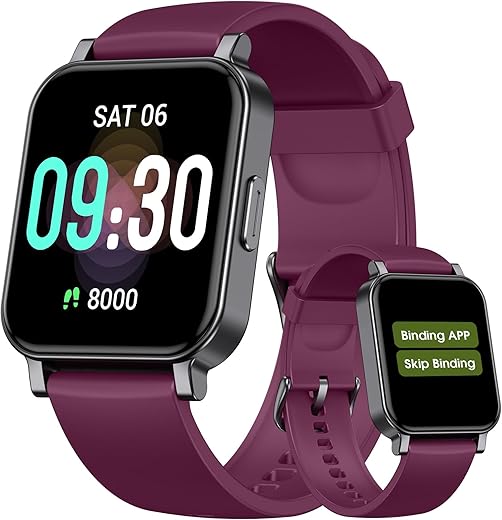
Fitness trackers for seniors
In the United States, the population of seniors is rapidly growing; by 2030, all baby boomers will be over the age of 65, which means one in every five residents will be of retirement age. This statistic highlights the growing market for senior-focused health and fitness technologies. Fitness trackers, once regarded as gadgets for the young and tech-savvy, are now increasingly designed with seniors in mind, offering features that cater to their specific health and activity monitoring needs.
The concept of fitness trackers evolved from simple pedometers that only counted steps to sophisticated devices that monitor heart rate, sleep patterns, and even provide sedentary reminders. For seniors, the development of these trackers has been particularly significant. Modern fitness trackers for the elderly come with easy-to-read displays, fall detection alerts, and emergency response features, making them not just a tool for fitness, but also a companion for safety and peace of mind.
One engaging feature about fitness trackers that has garnered considerable attention is their ability to encourage a more active lifestyle among seniors. A compelling statistic from the Journal of the American Medical Association indicates that the use of wearable devices significantly increases physical activity levels, even among older adults. This finding is crucial because maintaining an active lifestyle can dramatically improve the quality of life for seniors, reducing the risk of chronic diseases and cognitive decline.
Fitness trackers for seniors are also gaining recognition for their social connectivity features. Many devices can connect to smartphones or online communities, which can help reduce feelings of isolation by allowing seniors to share their progress with friends, family, or group members. This digital companionship can motivate them to stay active and foster a sense of belonging and accomplishment as they reach their fitness goals.
With the increasing attention to health in older age, fitness trackers are continuously being adapted to offer more personalized insights. They now have the capability to track medication schedules, hydration levels, and stress management, providing a holistic approach to wellness. Additionally, with advancements in wearable technology, some fitness trackers can predict and alert users to potential health issues—before they become emergencies. This predictive technology represents a major leap forward in empowering seniors to take proactive control over their health.
What Are the Best Fitness Trackers for Seniors Seeking an Active Lifestyle?
Fitness trackers have become powerful tools in promoting an active lifestyle, especially for seniors who seek to maintain their wellbeing with age. These devices offer a range of benefits tailored to older adults, such as monitoring heart rate, tracking steps and activities, encouraging movement, and even fall detection in certain models. Importantly, they can be a motivating factor for seniors to stay active and can help provide peace of mind for both users and their loved ones by keeping an eye on key health metrics. With user-friendly interfaces and features designed to cater to the specific needs of seniors—like larger displays and emergency buttons—fitness trackers can greatly assist in their quest for a healthy and independent lifestyle. Dive in as we explore the various options and find the most suitable fitness tracker that combines ease of use with essential health-tracking features for seniors.
Fitness Trackers for Seniors: Importance and Benefits
Fitness trackers for seniors have become increasingly important as a tool for promoting a healthy and active lifestyle. With advancing age, maintaining regular physical activity can help in preventing chronic diseases, enhancing mental health, and improving overall quality of life. Fitness trackers provide a straightforward way for seniors to monitor their daily activity levels, set personal goals, and stay motivated.
The benefits of using fitness trackers are manifold. They can help monitor heart rate, track steps, calculate calories burned, and even monitor sleep patterns. For seniors, especially, features such as medication reminders, emergency alerts, and GPS tracking for those with cognitive impairments add a layer of safety and peace of mind for both the user and their families.
Choosing the Right Fitness Tracker for Seniors
Selecting the appropriate fitness tracker for an older adult depends on various factors, including ease of use, readability of the display, comfort, and the particular health goals or needs of the individual. Devices with large screens, simple interfaces, and a comfortable fit are generally preferred by seniors. Additionally, a fitness tracker with a long battery life is beneficial to eliminate the need for frequent charging.
Some seniors might distinctly benefit from a tracker with fall detection technology or one that can sync with their existing medical devices. Such features can contribute to a senior’s independence while also ensuring their safety.
Physical Activity Guidelines for Seniors
When using fitness trackers, it’s essential to understand the recommended physical activity guidelines for seniors. The World Health Organization advises that older adults aged 65 and over should do at least 150 minutes of moderate-intensity aerobic physical activity throughout the week. Alternatively, they can engage in at least 75 minutes of vigorous-intensity activity or a combination of both.
In addition to aerobic activity, muscle-strengthening activities involving major muscle groups should be done on two or more days a week. Fitness trackers can facilitate this by allowing seniors to track their strength training exercises, repetitions, and consistency.
Integration with Smart Technology
There has been a trend in integrating fitness trackers with other smart technology to create an interconnected health monitoring system. For seniors, especially those who are tech-savvy, fitness trackers that pair with smartphones or smart home devices can provide additional data and insights into their health, allowing them to make better-informed decisions about their lifestyle.
These smart integrations can also enable remote monitoring by family members or caretakers, providing a layer of security and convenience. Remote access to activity data can also facilitate discussions with healthcare providers, making it easier to tailor health and exercise plans according to individual needs.
Impact on Senior Health and Lifestyle
Fitness trackers have had a significant impact on senior health and lifestyle. By providing real-time feedback and historical data, seniors become more conscious of their daily activity levels and are encouraged to be more active. This data-driven approach can lead to substantial improvements in physical activity, potentially reducing the risk of falls and other accidents associated to a sedentary lifestyle.
Moreover, the social features included in some fitness trackers, such as sharing achievements or competing with friends, have the potential to add a communal aspect to exercise, which can be highly beneficial for seniors’ mental health.
Statistics Reflecting Fitness Tracker Adoption among Seniors
According to a recent survey, adoption rates of wearable fitness trackers among seniors have seen a steady increase. As of 2021, approximately 21% of Americans aged 65 and older reported using a fitness tracker or a smartwatch. This reflects a growing trend in the incorporation of digital health tools among the older population, highlighting the importance of developing accessible and user-friendly devices tailored for this demographic.
1. Why are fitness trackers beneficial for seniors?
Fitness trackers are beneficial for seniors because they help monitor activity levels, encourage regular exercise, track sleep patterns, and sometimes even monitor heart rate and other vital signs. This can lead to improved health outcomes and can provide valuable data for healthcare providers to tailor wellness plans.
2. Can fitness trackers remind seniors to stay active?
Yes, most fitness trackers have features that allow for setting activity reminders. They can be programmed to alert seniors when they have been inactive for a certain period, prompting them to move around or exercise.
3. Are fitness trackers easy for seniors to use?
Many fitness trackers are designed with simplicity in mind, offering user-friendly interfaces and straightforward functions. However, ease of use can vary between models, so it’s worth looking for trackers that specifically cater to seniors with features like large displays or simple navigation.
4. What should seniors look for in a fitness tracker?
- Larger display for easy readability
- Simple interface and navigation
- Long battery life for convenience
- Comfortable and secure fit
- Essential health monitoring features like step counting and heart rate monitoring
5. How can seniors ensure they choose a comfortable fitness tracker?
Seniors should try on different models to find a comfortable fit, paying attention to the band’s material and closure mechanism. It’s also beneficial to read reviews focusing on comfort and to choose trackers that are lightweight and ergonomically designed.
6. Do fitness trackers need to be paired with a smartphone or computer?
Many fitness trackers are designed to sync with a smartphone or computer to log data, offer better insights, or access additional features. However, there are also models that can be used independently, though they might have limited functionality.
7. Are there any privacy concerns seniors should be aware of with fitness trackers?
Seniors should be mindful of how their data is stored and used by fitness tracker companies. It’s important to read the privacy policy of the device to understand data management practices and to use secure passwords and connections when syncing the tracker.
8. What is the average cost of a fitness tracker suitable for seniors?
The cost of fitness trackers can range widely from around $30 to over $300, depending on the brand, features, and technology. Affordable options with basic features suitable for seniors are widely available.
9. Can fitness trackers withstand water and wear-and-tear?
Most fitness trackers are designed to be durable and many offer water resistance. However, the level of protection varies, so it is essential to check the specifications of the tracker to ensure it meets the individual’s lifestyle needs.
10. How accurate are fitness trackers in monitoring health metrics?
Fitness trackers are generally accurate for giving an overview of activity levels and health metrics. However, they should not be relied upon for medical diagnostics. Their accuracy can vary by brand and model, and some functions, like step counting or heart rate monitoring, may be more reliable than others.
Conclusion
Fitness trackers for seniors offer an invaluable resource for maintaining and improving their overall health and well-being. These devices provide a tangible means for the elderly to monitor their physical activities, set and achieve fitness goals, and stay motivated through progress tracking. Furthermore, the integration of features such as heart rate monitoring, sleep analysis, and sedentary reminders cater to the unique needs of seniors, enabling them to stay proactive about their health. With user-friendly interfaces and the ability to connect with peers or caregivers, fitness trackers facilitate a sense of community and support, which is immensely beneficial for the mental and social aspects of a senior’s health.
The adoption of fitness trackers by the senior population demonstrates a proactive approach to aging, embracing technology to promote a healthier and more active lifestyle. These devices not only deliver immediate feedback on daily activities but also inspire a level of autonomy and control over one’s health journey. Moreover, the safety features incorporated into many fitness trackers, such as fall detection and emergency alerts, offer peace of mind to both seniors and their loved ones. Overall, fitness trackers have proven to be a versatile and empowering tool for seniors, serving to enhance their quality of life and provide vital health insights for them and their healthcare providers.






